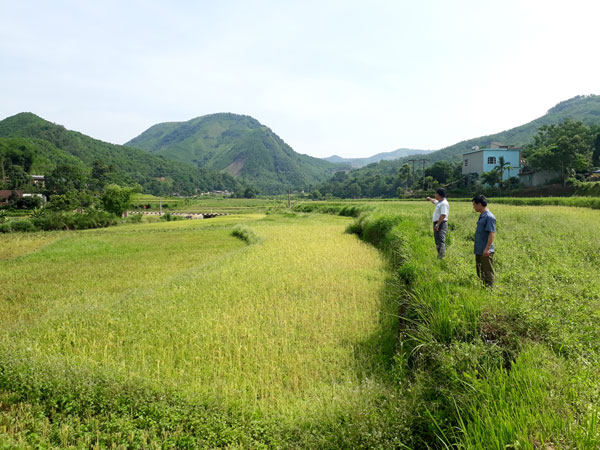
(HBO) – A slow change in the economic structure, along with difficulties in production due to natural disasters, droughts and abnormal fluctuations of the market, have challenged the process of poverty reduction in Lap Chieng commune, Kim Boi district, the northern mountainous province of Hoa Binh.
Lap Chieng has been
received assistance from the government through Programmes 135 which is
designed to help poor communes in ethnic minority-inhabited and mountainous
areas with socio-economic development. The commune is about 10 km from
the centre of Kim Boi district.
Lap Chieng commune comprises three villages,
Lap, Chieng and Khoay, with 438 households. Despite its favorable geographical
location, only 3km from Road 12B and having concreted inter-communal roads, the
transformation of Lap Chieng’s economic structure remains slow, failing to
match its potential. Therefore, the poverty rate in the commune in 2016 was
still high, at 44.8 percent, with the per capita income reaching only 14
million VND per year.
Small
rice fields and droughts have caused difficulties to production in Lap Chieng
commune (Kim Boi district). Photo taken in Chieng village.
By the end of 2016, Lap Chieng had fulfilled 12
criteria of new-style rural area building. Currently, along with the criteria
that require large investment resources, the commune finds it hard to achieve
the criteria in raising local people’s income. Local residents mostly rely on
agriculture without commercial products. The policy of "land mergence and field
exchange” has not been implemented because of a lack of consensus among local
farmers.
According to the Secretary of the commune’s
Party Committee, in 2016, when the price of pork increased sharply, many
households in Lap Chieng invested in expanding pig farms. Therefore, when the
price of pork slumped, local farmers fell into the situation of "double
loss." As a result, this year's target of increasing the per capita income
to 15 million VND per person per year is likely unreachable.
Among the three villages, Khoay village has the
poorest transport system, which hinders the locality to tap its potential in
forestry and bamboo shoot growing.
In Chieng village, fields are filled with different
colours these days. At the beginning of the village, some rice fields are ripe
and are ready for harvesting. Meanwhile, some other fields are still green and
mixed with weeds. Some maize fields are stunned because of exhausted land.
Bui Van Chien, head of Chieng village, said that
farming land in the village is divided into three areas, two of which often
suffer severely droughts. Some fields are left deserted because "there is
no water for farming."
In Dong Me area, many fields are quite large but
do not have enough water for rice cultivation, thus becoming cattle grazing
areas. Some other fields have been cultivated with rice but they have seen more
weeds than paddy. Chieng village has three water reservoirs but the water
volume is still not enough as the water reserve depends on rains.
The Secretary of the commune Party Committee
stressed the need to focus on communications to fulfil the plan of "field
mergence and field exchange”, creating favourable conditions for the
restructuring of the local economy. Alongside, it is important to find crops
and livestock which are suitable to the local conditions, he said, adding that
in the near future, the commune will focus on promoting forest plantation and
cultivation of safe and clean vegetables.
Viet Dao
In Lac Thuy district, communes have been succeeded in promoting their One Commune-One Product (OCOP) products while others are still struggling to position their typical farming products in market. Some communes in the district still fail to have their products met OCOP programme’s requirements, while others have seen their certifications expired.
The inspectorate agency of Hoa Binh province has issued Official Dispatch No. 1090/TTr-PCTN to provincial departments, agencies, localities, business associations, enterprises, and investors regarding measures to improve informal component indexes of the Provincial Competitiveness Index (PCI).
Hoa Binh is taking concrete steps to improve its investment environment, with a strong focus on supporting businesses, settling obstacles for strategic investors, and creating opportunities for robust development in the coming years.
Under the blazing early summer sun, the construction site of Nhuan Trach Industrial Park (IP) in Luong Son district is abuzz with activities from dawn to dusk, a testament to the determination of the investor to meet their construction targets on schedule.



